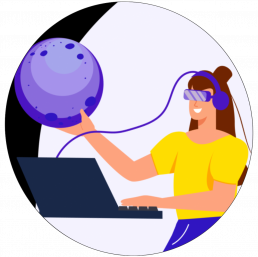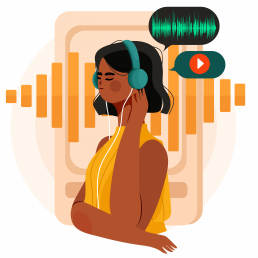How People Participated in Eclipse Soundscapes
The Eclipse Soundscapes (ES) Project invited the public to take part in a historic study of how eclipses affect life on Earth during the October 14, 2023 annular eclipse and the April 8, 2024 total eclipse. Active participation in the project is now complete, but thousands of volunteers helped make history as Apprentices, Observers, and Data Collectors. Their work created a rare, multi-sensory record of these events and a powerful open dataset that continues to support scientific discovery.
Below, you can explore what each role involved and how every participant contributed.
Roles Overview
These four roles formed the core of the Eclipse Soundscapes project. While new participation closed after the April 2024 total eclipse, many volunteers, especially Data Collectors, remained involved through 2025 by following how their recordings moved through processing and validation, reviewing site metadata, exploring shared maps and spreadsheets, and joining webinars to learn about preliminary results. You can still explore how each role contributed and follow the continuing story of the data on the Your Data in Action page.
- Apprentices learned about eclipses through free online lessons that built a foundation of knowledge before observing or collecting data.
- Observers used all of the senses available to them to experience the eclipse and share their multi-sensory observations online, helping scientists understand how people and animals responded to the sudden change in light and temperature.
- Data Collectors deployed AudioMoth devices to record soundscapes before, during, and after the eclipses; their recordings formed the foundation of the Eclipse Soundscapes dataset, which has since been analyzed to study how eclipses affect life on Earth.
- Data Analysts shifted from volunteer listening to automated BirdNET analysis, with ES openly sharing each step from data receipt to results.
Eclipse Soundscapes Apprentice


Scientists spend time learning about their topic of study before making observations or collecting data. Therefore, Apprentices spent time building a foundation of knowledge about solar eclipses through free online lessons. This role was recommended as the first step for all participants. The free online lessons are still available, but without a certificate of completion.
- Free online lessons, no sign-up required
- No location requirements
- Completion certificate provided if completed before 4/15/2024
- Was available in English y Español!
Eclipse Soundscapes Observer


Observation is very important in science as it allows us to create and test hypotheses. ES Observers used whichever senses were available to them during the 2023 annular solar eclipse and/or the 2024 total solar eclipse to observe the eclipse. Then they submitted their multi-sensory observations online via a web form. This role was modeled after a participatory science project dating back to the 1930s. Learn more about that study by visiting “The Science.”
- Free online training, sign-up encouraged
- No equipment needed
- Observations submitted online and recognized with a certificate (before April 15, 2024)
Learn more about how volunteers participated as ES Observers by clicking here.
Eclipse Soundscapes Data Collector


As scientists conduct research, they collect data, often with tools that help them enhance their senses and recording abilities. During the week of the 2023 annular solar eclipse or the week of the 2024 total solar eclipse, Data Collectors used AudioMoth devices equipped with micro-SD cards to collect and record soundscapes data on or near the eclipse path. Their recordings formed the foundation of the ES dataset that was analyzed to determine how eclipses affect life on Earth. Read more about the data and results on the “Your Data in Action” page.
- Required registration and a site location along or near the eclipse paths
- Equipment: AudioMoth and microSD cards
- Open to participants age 13 and older
- Participants received a Data Collector Certificate of Completion
Learn more about how volunteers participated as Data Collectors by clicking here.
Eclipse Soundscapes Data Analysis


When Eclipse Soundscapes launched in 2021, the plan was for volunteer Data Analysts to listen to recordings and help identify patterns. By 2024, advances in machine learning, particularly tools like BirdNET, made automated species detection the most effective path for analysis.
Rather than asking volunteers to listen for the sake of listening, the ES team kept the analysis process transparent by sharing updates, preliminary results, and behind-the-scenes information through the website, webinars, and blogs.
Participants were also encouraged to continue their journey through platforms like SciStarter and Zooniverse, which host hundreds of participatory science projects where public contributions directly advance research.
This approach ensured volunteers could still follow how the analysis was done and what it revealed, while putting their time toward activities that made the most impact.


The partnership was mutually beneficial: SciStarter helped amplify outreach and recruitment, while Eclipse Soundscapes provided volunteers with meaningful opportunities to contribute to NASA-supported science. Together with SunSketchers, we documented this collaboration in a published paper: A Model for Success: SciStarter Partnerships with Eclipse Soundscapes & SunSketchers.
“SciStarter is a globally acclaimed, online citizen science hub where thousands of projects, searchable by location, topic, age level, etc., have been registered by individual project leaders or imported through partnerships with federal governments, NGOs, and universities.” (Learn more about SciStarter)
Stay Updated!
Sign up here to receive Eclipse Soundscapes information, updates, and news!